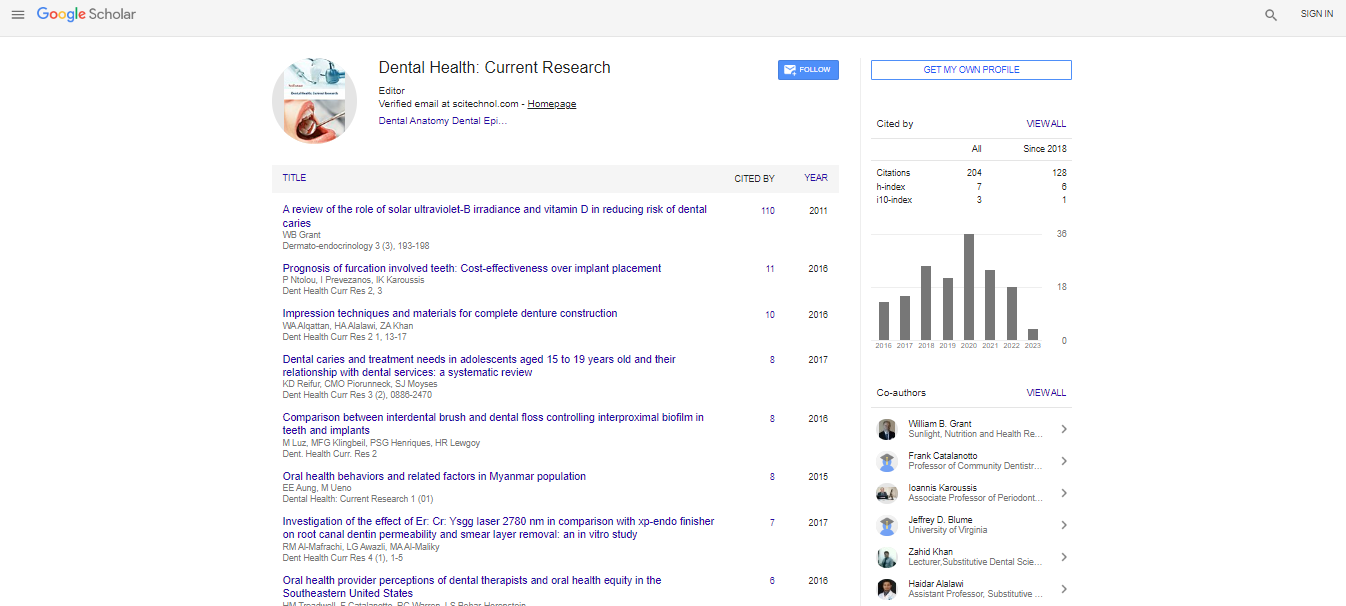Opinion Article, Dent Health Curr Res Vol: 9 Issue: 3
Effects of the Oral Microbiome on Health and Disease
Mario Lee*
1Department of Systems Medicine, Tor Vergata University of Rome, Rome, Italy
*Corresponding Author: Mario Lee,
Department of Systems Medicine, Tor
Vergata University of Rome, Rome, Italy
E-mail: mario34@gmail.com
Received date: 29 May, 2023, Manuscript No. DHCR-23-106748;
Editor assigned date: 31 May, 2023, PreQC No. DHCR-23-106748 (PQ);
Reviewed date: 14 June, 2023, QC No. DHCR-23-106748;
Revised date: 21 June, 2023, Manuscript No. DHCR-23-106748 (R);
Published date: 28 June, 2023, DOI: 10.4172/2470-0886.1000164
Citation: Lee M (2023) Effects of the Oral Microbiome on Health and Disease. Dent Health Curr Res 9:3.
Description
The human oral cavity is home to a vast and diverse community of microorganisms, collectively known as the oral microbiome. These microorganisms include bacteria, viruses, fungi, and archaea, forming complex ecosystems that play a vital role in maintaining oral health and influencing overall systemic health.
Balance and diversity in the oral microbiome
A healthy oral microbiome is characterized by a delicate balance and diversity of microorganisms. The predominant bacterial species are generally commensal, meaning they coexist peacefully with their human host, providing essential functions like maintaining the oral pH and supporting the immune system. However, this delicate balance can be disrupted by various factors, leading to dysbiosis, an imbalance that can contribute to oral health problems.
Oral health and the role of the oral microbiome
The oral microbiome plays a fundamental role in maintaining oral health. It forms a protective barrier against pathogenic microorganisms by competing for resources and space. Additionally, commensal bacteria produce antimicrobial substances, further inhibiting the growth of harmful organisms. These mechanisms help prevent conditions like dental caries (cavities) and periodontal diseases, which are linked to dysbiosis and unchecked microbial growth.
Linking oral and systemic health
The oral cavity is not isolated from the rest of the body; rather, it serves as a gateway to the internal systems. Mounting evidence suggests that the health of the oral microbiome can influence various systemic diseases. For instance, periodontal disease has been associated with an increased risk of cardiovascular disease, diabetes, and respiratory conditions. The inflammatory response triggered by oral pathogens in the bloodstream can have far-reaching consequences for overall health.
Immune system interactions
The oral microbiome plays a vital role in training and modulating the immune system. In infancy, exposure to various oral microorganisms helps develop a strong and adaptive immune response. Moreover, the oral microbiome constantly interacts with the immune system, maintaining a balance between host defense and tolerance. Dysbiosis can lead to an overactive immune response, resulting in chronic inflammation and contributing to the development of autoimmune disorders.
Impact of diet on the oral microbiome
Diet profoundly influences the composition and function of the oral microbiome. High-sugar and high-carbohydrate diets provide an ample food source for harmful bacteria, promoting their growth and increasing the risk of dental caries. In contrast, diets rich in fiber and certain nutrients support beneficial bacteria, promoting oral health. Understanding the role of diet in shaping the oral microbiome can aid in developing dietary strategies to maintain oral health.
The role of oral hygiene
Maintaining proper oral hygiene is essential in promoting a balanced oral microbiome. Regular brushing and flossing help remove plaque and reduce the number of harmful bacteria in the oral cavity. However, overzealous oral hygiene practices can also disrupt the delicate balance of the microbiome, underscoring the importance of striking the right balance in oral care.
Therapeutic interventions and future directions
The knowledge gained about the oral microbiome has opened up new avenues for therapeutic interventions. Probiotics, prebiotics, and personalized microbiome-based treatments hold promise in restoring and maintaining a balanced oral microbiome. Additionally, ongoing studies aims to uncover the intricate relationships between the oral microbiome and various systemic diseases, paving the way for novel preventive and therapeutic approaches.
Conclusion
The oral microbiome plays a vital role in both oral health and overall systemic health. Understanding its significance and maintaining a balanced microbial community is vital in preventing oral diseases and potentially mitigating systemic health issues. As studies in this field continues to expand, so does the understanding of the complex interactions between the oral microbiome and human health, providing hope for improved preventive and therapeutic strategies in the future.
 Spanish
Spanish  Chinese
Chinese  Russian
Russian  German
German  French
French  Japanese
Japanese  Portuguese
Portuguese  Hindi
Hindi 